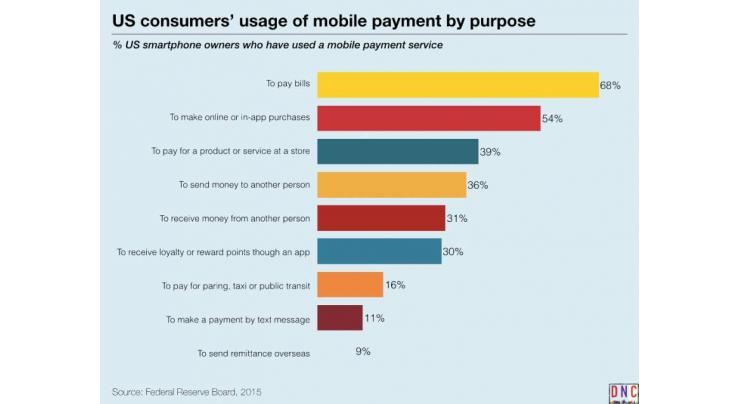
67 % Populace Believes Utility Bills Payment Via Mobile Useful
Innovation
Sumaira FH Published July 28, 2016 | 06:41 PM

ISLAMABAD, (UrduPoint / Pakistan Point News - 28th july, 2016) : The payment of utility bills through Branchless Banking (BB) in the country is becoming increasingly popular among Pakistanis as around 67 per cent of them believed that making payments with mobile money agents is a useful innovation. Majority of populace consider branchless banking a useful mean for paying monthly utility bills for electricity, gas, sewerage and Internet, a latest survey has revealed.
On the other hand, 33 per cent of respondents did not consider it as an innovation. As per State Bank of Pakistan (SBP), the number of branchless banking agents is more than 0.3 million who perform bill payments on behalf of customers. In last quarter of 2015, there were 27 million transactions made on account of utility bill payments and Rs.
35.8 billion were transferred to different utility companies throughout the country. There are nine branchless banking services in Pakistan naming Easypaisa, Jazzcash, U Paisa, Mobile Paisa, Timepey, HBL Express, Meezan Upaisa and UBL Omni. Branchless Banking is becoming a well-received concept in the country as services like Telenor's Easy Paisa, UBL's Omni and Ufone's U-Payment have played their part in popularizing the concept of mobile money transfers and mobile banking within Pakistan. The survey revealed that slightly more men than women agreed that making payments through mobile money agents is a useful innovation. A majority of urban (71 per cent) and rural (65 per cent) respondents agreed that sending and receiving money through mobile money agents is a useful innovation within financial services.
With regard to provincial breakdown, the survey said majority of respondents in all provinces except Balochistan agree that making payments with agents such as EasyPaisa is a useful innovation. A rural/urban breakdown revealed that 71 per cent of the respondents in urban areas and 65 per cent in rural areas agreed to the statement that `making payments with agents is a useful innovation.' Based on these empirical results, it is encouraging to see that concept of mobile money has also managed to penetrate the rural population of Pakistan.
This relatively high figure for rural population is a testament to the growth and increasing familiarity and popularity of mobile money transfers via agents. Urban areas, with a greater concentration of high income individuals and banking facilities, naturally have more respondents who are aware of this digital financial service.
Furthermore, 29 per cent in urban areas disagreed with the statement while the same answer was given by 35 per cent of the respondents in rural areas. According to breakdown, 71 per cent of respondents in Punjab, 66 per cent in Sindh, 60 per cent in Khyber Pakhtunkhwa (KPK) and 42 per cent in Balochistan agreed that making payments through mobile money agents is a useful and beneficial innovation.
On the other hand, 29 per cent of respondents in Punjab, 34 per cent in Sindh, 40 per cent in KPK and 58 per cent in Balochistan disagreed with the statement. Gallup Pakistan in collaboration with HORUS Development Finance conducted the survey in over 10,000 households across Pakistan.
Related Topics
Recent Stories

Israel carries out attack inside Iran, report US media

Saudi Assistant Minister of Defence calls on army chief

Currency Rate In Pakistan - Dollar, Euro, Pound, Riyal Rates On 19 April 2024

Today Gold Rate in Pakistan 19 April 2024

Rock-solid Ruud racks up season-leading win in Barcelona

At UN, Iran says it will make Israel 'regret' reprisals

G7 hears calls for 'critical' Ukraine aid

EU seeks to leverage might to confront China, US challenge

5 Customs officials martyred as their vehicle ambushed by terrorists in D I Khan

Pak-New Zealand match called off due to rain

NHA restores traffic on roads affected by recent rains in Balochistan

China to fully support Pakistan's efforts against terrorism: Ambassador Jiang
More Stories From Pakistan
-
Sukkur authorities focus on food safety, quality control in wheat purchases
2 minutes ago -
Spring Flower Show attracts students in Agri University at large
31 minutes ago -
Election campaigns for by-poll in four KP constituencies end: EC
31 minutes ago -
Police pays tribute to late officer Rubina Shehbaz at her funeral prayer
32 minutes ago -
Girl killed; house destroyed in landslide
32 minutes ago -
Rains, thunderstorms to continue in KP
41 minutes ago
-
KPRA, USAID-ERDA arrange on the spot registration facility for women entrepreneurs
42 minutes ago -
ICP continues crackdown against smoke emitting vehicles
42 minutes ago -
Heavy rain in Peshawar, suburbs continue
1 hour ago -
Sargodha receives rain
1 hour ago -
SABS University expels deputy director from service on harassment charges
2 hours ago -
Attack on foreign nationals convoy foiled
2 hours ago